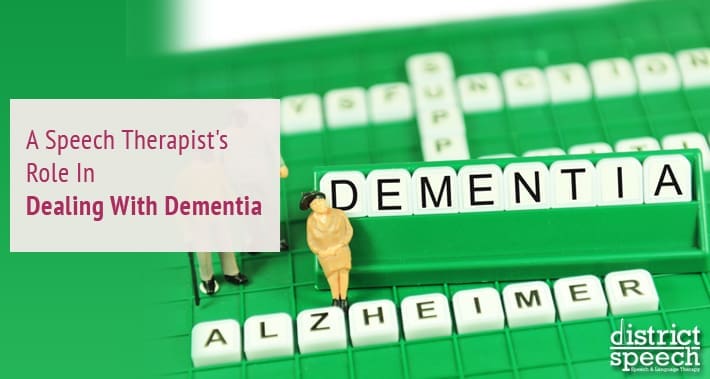
Dementia is a syndrome that affects a wide segment of the population.
It is a progressive syndrome, which means that it slowly gets worse over time.
But the good news is that speech therapy can slow the progression of symptoms associated with dementia and help you or your loved one maintain independence for longer.
This is due to the many benefits of speech therapy, both in person and via teletherapy, on your cognitive functioning.
RELATED: The Benefits Of Speech Teletherapy Sessions
Here at District Speech, our Washington DC speech therapy clinic can help if you or a loved one has dementia.
But for now, let’s take a closer look at a speech therapist’s role in dealing with dementia.
What Is Dementia?
Dementia is a syndrome that causes a progressive decline of cognitive function and memory.
As it progresses, it can get so severe that it heavily interferes with daily independent living.
Unfortunately, the end stages of dementia typically require the help of nursing homes and palliative care.
What Causes Dementia?
Dementia may be caused by several different neurodegenerative diseases.
These include:
-
- Alzheimer’s disease
- Huntington’s disease
- Lewy body disease
- Vascular pathology
- Parkinson’s disease
Alzheimer’s disease is currently the leading cause of dementia.
In other cases, dementia develops due to progressive changes in brain function.
RELATED: Science Hour: A Brain Process That Affects Language
This may occur due to a variety of medical conditions, such as:
- Traumatic brain injury
- Multiple sclerosis
- Human immunodeficiency virus (HIV)
Genetics also play a role.
According to the Alzheimer’s Association, your chances of developing Alzheimer’s increases if you have a parent or sibling with the disease.
What Are The Symptoms Of Dementia?
The symptoms of dementia vary depending on the stage of the syndrome.
But generally speaking, the symptoms and diagnostic criteria for dementia are focused on cognitive deficits and general decline from previous levels of cognitive performance in areas such as:
- Complex attention
- Executive function
- Learning ability
- Memory
- Language
- Social cognition
Now, let’s explore the three main stages of dementia.
Symptoms Of Early Stage Dementia
The early stage of dementia includes gradual confusion and personality changes.
You may notice your loved one become frustrated or irritable over unusual things.
This may also be accompanied by anxiety and antisocial tendencies.
RELATED: Can Speech Therapy Improve Mental Health?
Completing routine chores become extra difficult, and you may notice that they begin avoiding them.
This is because it takes longer to complete tasks and is extra difficult for them to follow through because of an inability to focus.
RELATED: Speech Therapy Treatments For ADHD
At this stage, going out in public starts to become a challenge because it is easy for your loved one to get confused.
This can also occur with their items and often leads to them accusing those around them of hiding or stealing their things.
Symptoms Of Middle Stage Dementia
The middle stage of dementia involves an increase in most of the symptoms from the early stage of dementia.
You’ll most likely notice that your loved one’s confusion is more obvious, and so is their memory loss.
Specifically, they may even forget very recent events and the identity of their family members.
Symptoms are often more prevalent in the late afternoon and evening, so don’t be alarmed if you notice that they are more suspicious, irritable, restless, or fidgety right before bed.
Symptoms Of Late Stage Dementia
Finally, late stage dementia is the most challenging for everyone involved.
At this point, your loved one will have lost the ability to recognize those closest to them, including their own reflection.
It is common for them to lose weight, regardless of their diet, and they will often fidget and shake.
Without treatment, they may experience severe communication deficits and even lose the ability to communicate completely, using moans and hand movements instead.
These are situations where augmentative and alternative communications (AAC) might be helpful, but it’s very difficult for someone with dementia at this level to learn anything new.
RELATED: Understanding AAC For Nonverbal Autistic Children
How Can A Speech Therapist Help With Dementia?
The good news is that adult speech therapy in Washington DC can slow the progression of symptoms by engaging with the same variety of cognitive functions that dementia impairs.
Speech therapists are skilled at helping patients with dementia in a variety of ways.
A 2021 study by Lanzi, Ellison, and Cohen argues that speech therapists play an important role in the support of patients with dementia, their families, as well as other healthcare professionals.
The goal is for your loved one to maintain their independence for as long as possible.
Your speech therapist can stimulate cognitive ability through different activities that target specific aspects of the cognitive domain.
In addition to working with their deficits, your speech therapist will teach your loved one how to modify their environment, which is crucial to adapting to the ongoing cognitive changes dementia causes.
Below are some common strategies your speech therapist may use.
1. Cognitive Stimulation Therapy
Cognitive stimulation therapy is a group treatment focused on patients with mild to moderate dementia.
Your speech therapist will use theme based, mentally stimulating activities geared towards improving cognitive functions.
This includes things like thinking, concentration, and memory.
2. Memory Aids
Memory aids are a great tool for helping your loved one with their daily activities.
The goals are to:
- Compensate for memory deficits
- Maximize independence
- Improve conversation
- Reduce anxiety
- Decrease responsive behaviors like repetitive questioning
Some examples include checklists, daily planners, calendars, programmable watches, smart phones, recorded messages, communication cards, and a memory book.
These are great tools both for going about daily activities and for helping with the retrieval of personal information.

3. Validation Therapy
Validation therapy is an approach that validates and accepts the values, beliefs, and reality of the person with dementia.
The goal is to reduce stress and provide opportunities for your loved one to communicate.
This in turn promotes contentment and diminishes negative behaviors.
4. Environmental Changes
Environmental changes are physical adaptations to the environment that can improve your loved one’s quality of life.
The goal is to support communication by reducing physical barriers caused by impaired body function.
Some examples of these changes include:
- Personalizing living spaces to help memory
- Reorganizing living spaces to provide a clear line of site to items and locations
- Minimizing background noises by improving audibility and using amplification devices as needed
5. Other Possible Treatments
There are a number of other possible treatments your speech therapist can use to help your loved one slow the progression of symptoms.
Some examples include:
- Computer based treatment
- Eating and swallowing interventions
- Spaced retrieval
RELATED: Pediatric Speech Therapy Treatments For Feeding & Swallowing Disorders
This is far from an exhaustive list.
Book Your Appointment With District Speech Today
As you can see, speech therapy is a great resource to help you slow the progress of symptoms of dementia.
There are a number of different approaches your speech therapist can take to maximize the chances for your loved one’s success and extended independence.
This includes maintaining their complex attention, executive function, learning, memory, language, and even social cognition.
RELATED: Speech Therapy Treatments For Social Communication Disorder
The earlier you begin therapy after a diagnosis, the greater your chances for success.
Book an appointment today with District Speech And Language Therapy to get started and schedule an evaluation.
Book your appointment with District Speech today to find out how we can help keep your loved one with you for longer.
1300 I St NW, Suite 400 E,
Washington, DC 20005
- https://g.page/districtspeech
District Speech and Language Therapy specializes in speech therapy, physical therapy, and occupational therapy solutions, for both children and adults, in the Washington D.C and the Arlington Virginia areas.